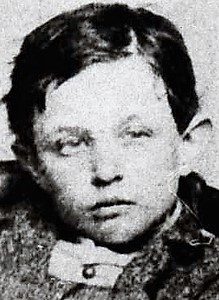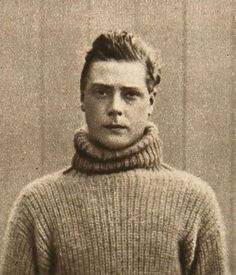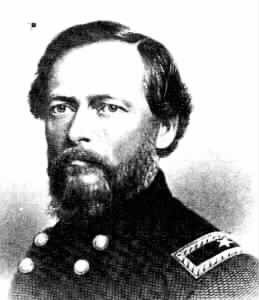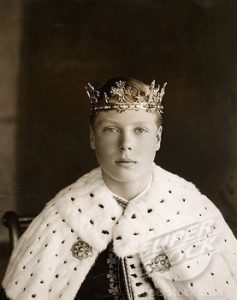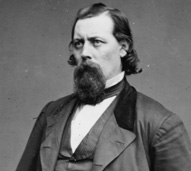
Ward Hill Lamon
Previously in the novel: War Secretary Edwin Stanton held President and Mrs. Lincoln captive under guard in basement of the White House. He guided his substitute Lincoln through his first Cabinet meeting. Then he told Lincoln’s bodyguard Ward Hill Lamon into believing Lincoln and his wife were in hiding because of death threats. Lincoln’s secretaries realize something is wrong but are afraid to say anything. Janitor Gabby Zook, caught in the basement room with the Lincolns, begins to think he is president. Mrs. Lincoln decides to befriend him.
One mid-afternoon, after two months of ruminations about his confrontation with Secretary of War Stanton and his henchman Lafayette Baker over the disappearance of Abraham Lincoln and the substitution of a double, Ward Lamon climbed the steps of the Executive Mansion,. Entering the door, he nodded at guard John Parker, who, he noticed, was already glazed of eye from an early beer. Coming down the stairs was Stanton; Lamon quickened his step. Stopping abruptly when he saw Lamon, Stanton pursed his lips.
“Mr. Lamon, what are you doing here?”
“Remember, it was your idea I come back,” Lamon replied. “After all, Abraham Lincoln is a personal friend of mine. He allowed me to pretend I was his law partner once. Even if I don’t work for him anymore, I’m still his friend.”
“Lamon…”
“And people might wonder why I never visit my old friend anymore.”
Stanton puffed, stammered, but ultimately walked away. Lamon mounted the grand stairway, skipping every other step, eager to meet the impostor. Going down the hall, Lamon looked around and spotted the new Mrs. Lincoln, obviously a double because she had kinder eyes than the real Mary Lincoln. Opening the door, Tad smiled at Lamon.
“Mr. Lamon! I haven’t seen you in a coon’s age!”
“Good to see you, Tad.” He patted the boy’s shoulder. Despite the opinions of others, Lamon liked Lincoln’s rambunctious son, because he reminded Lamon of himself as a child. If Tad survived his childhood, he would make a good bodyguard or policeman. “The marshal’s office has kept me busy. I promise not to be a stranger anymore.”
“Good.” Tad ran down the hall. “Tom Pen! Tom Pen!”
Continuing the other way, Lamon was eager to see the double, wondering if he measured up to the original. He went through the glass panels and turned right into the first office. The bearded man at the desk looked up, momentarily went blank, then smiled in recognition.
“Mr. Lamon, so good to see you again.”
Frowning, Lamon carefully shut the door, pulled a chair close to the president’s desk, then sat and leaned close the double.
“You’ve never met me before in your life and you know it.”
“I—I don’t know what you mean.”
“I know you’re a fraud, supposedly because my Mr. Lincoln is hiding out somewhere. I don’t believe it. Abraham Lincoln never hid from anybody.” He paused to examine the man’s eyes to detect what lurked behind them. “Where’s Mr. Lincoln?”
“I can’t tell you that.”
“Why not?”
“Mr. Stanton wouldn’t like it.”
“I don’t care what Mr. Stanton likes. What would Mr. Lincoln like?”
“I assume Mr. Lincoln wouldn’t like it either. After all, this entire situation is Mr. Lincoln’s idea. If he wanted Mr. Stanton to tell you, you’d know.”
Fluttering eyelashes betrayed him. Lamon decided the double was afraid of Stanton and couldn’t tell the truth. Standing, Lamon patted him on the shoulder.
“Well, we shall be friends then,” he said. “Don’t be bothered if I drop in from time to time for an aimless chat. I visited Mr. Lincoln often, and he enjoyed it.”
“Then I shall enjoy your visits too.”
Lamon left and went to the secretaries’ office. He had known Nicolay and Hay since the carefree days in Illinois. Lingering at their door, he listened to their conversation.
“…and she’s a senator’s daughter, in addition to being attractive and extremely well-mannered,” Hay said. “I think she’s potential matrimonial material.”
“Ja,” Nicolay replied. “And the president can give you away.”
